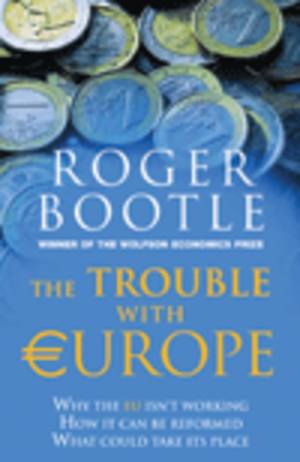The Trouble with Europe by Roger Bootle
Book review: The Trouble with Europe, by Roger Bootle Bootle makes the case for Britain leaving the EU. It's a book everyone should read, says Matthew Partridge.

Get the latest financial news, insights and expert analysis from our award-winning MoneyWeek team, to help you understand what really matters when it comes to your finances.
You are now subscribed
Your newsletter sign-up was successful
Want to add more newsletters?

The Trouble with Europe
By Roger BootlePublished by Nicholas Brealey Publishing (£18.99)(Buy at Amazon)
How quickly the mood towards Europe changed. A decade ago, the consensus was that the single currency was a success, with British membership seen as inevitable. Nowadays there is a good chance that any in/out referendum could result in Britain leaving the European Union altogether.
Try 6 free issues of MoneyWeek today
Get unparalleled financial insight, analysis and expert opinion you can profit from.

Sign up to Money Morning
Don't miss the latest investment and personal finances news, market analysis, plus money-saving tips with our free twice-daily newsletter
Don't miss the latest investment and personal finances news, market analysis, plus money-saving tips with our free twice-daily newsletter
Roger Bootle, the head of think-tank Capital Economics, uses his new book, The Trouble With Europe, to argue that this scenario is workable and desirable.
The book is divided into three concise sections. The opening two chapters look at the historical and political origins of the EU, including the legacy of World War Two, and previous pan European empires.
Chapters three, four and five look at the economics of the EU, and why Bootle thinks it isn't working. The final section looks at three alternatives to the status quo: a reformed Europe, a Europe without Britain and the EU dissolving entirely.
Bootle's overall view is that, while the EU could be changed to suit British interests, a better solution would be for Britain to leave and forge its own destiny.
Although the aim of this book is to put the Eurosceptic case, Bootle takes care to avoid hyperbole. He is at pains to stress that it is Britain's net contribution to the EU budget adjusted for the money that it gets back that matters, not the gross one.
He admits that integration has succeeded in preventing another war and in integrating the former communist states. He also says that the balance of pros and cons might be different if the EU lived up to its promises of reducing barriers to trade and eliminating onerous labour market regulations.
The book's main weakness is that it is still too optimistic that we could negotiate better deals from the Americans or Chinese. The negotiations over the EU-US trade deal show that Washington will demand wide-ranging concessions before it will even consider granting easier access to its markets. Beijing is also likely to drive a hard bargain.
Bootle also skates over the fact that, in the short term, the disruption caused by an exit from the EU could be immense. This is because firms would have to quickly adjust to changes in regulations for consumers, suppliers and competitors that they would have no power to influence.
He perhaps also underestimates the extent to which a spurned Brussels would be determined to punish Britain by making any transition as difficult as possible.
However, it is hard to disagree with his overall argument that the status quo is untenable. Even if you think that the solution lies with Britain remaining in a reformed EU, the publication of a credible plan for life outside Europe can only strengthen the hand of the UK in any future renegotiation. Even for this reason alone, The Trouble With Europe deserves to be widely read.
//
// ]]>
Get the latest financial news, insights and expert analysis from our award-winning MoneyWeek team, to help you understand what really matters when it comes to your finances.

-
 Do you face ‘double whammy’ inheritance tax blow? How to lessen the impact
Do you face ‘double whammy’ inheritance tax blow? How to lessen the impactFrozen tax thresholds and pensions falling within the scope of inheritance tax will drag thousands more estates into losing their residence nil-rate band, analysis suggests
-
 Has the market misjudged Relx?
Has the market misjudged Relx?Relx shares fell on fears that AI was about to eat its lunch, but the firm remains well placed to thrive